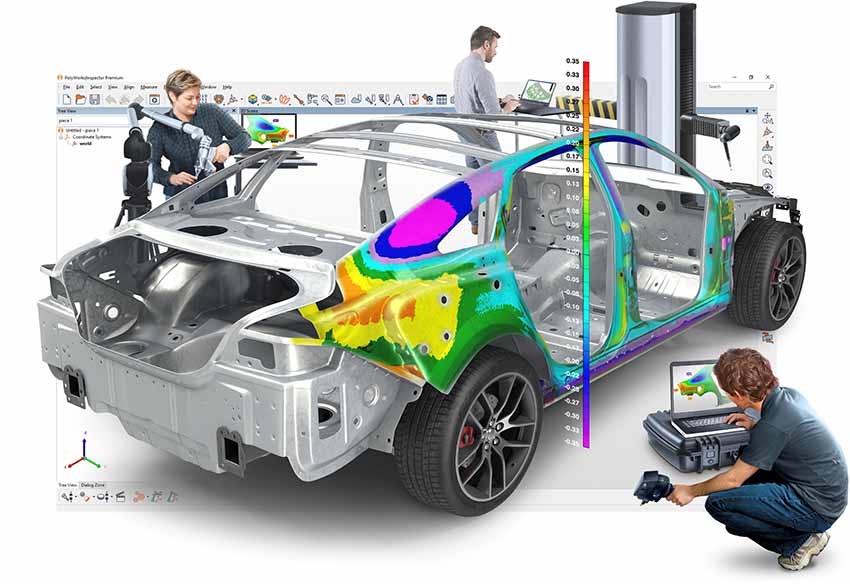InnovMetric is an independent software development company that helps manufacturers of all sizes digitally transform their 3D measurement processes. The company was founded in 1994 in Quebec City, Canada. Early in the start-up period, they realized that the potential lay in 3D dimensional analysis and quality control for industrial manufacturing, which led to the January 2000 launch of the flagship product, PolyWorks|Inspector.
Fifteen years later, following continued growth in the 3D metrology market, InnovMetric identified new opportunities to improve the clients’ performance and set out to create next-generation data management technologies and digital processes. The company’s software has become an industry standard.
InnovMetric currently works with 18,700 clients in 99 countries. Ninety-eight of the world’s top 100 manufacturers use PolyWorks solutions.
Interview with Marc Soucy, Founder of InnovMetric & Stefano Belotti, VP Sales at PolyWorks Europa.
Easy Engineering: Please introduce InnovMetric Software and PolyWorks Europa (activities, products, markets, European presence, etc.).
Marc Soucy & Stefano Belotti: Our 3D metrology software solutions are primarily designed in Quebec and Mexico. We hold a direct, commercial presence in 17 countries and employ over 500 workers. Why the large-scale international deployment? Because our clients’ success demands a local presence to provide the required technical services in their own language. Along with our partners, we provide direct technical support in 43 countries.
In 2015, the decision was made to open PolyWorks Europa in an effort to increase sales across three key European markets: France, Italy and Spain; we then opened our Czech Republic offices in 2021 to serve the Eastern European market. PolyWorks Europa currently employs 40 people.

E.E: What are the main trends that characterize the 3D metrology market with regard to industrial manufacturing?
M.S & S.B: As in many other sectors, our clients must decarbonize their operations while managing skilled labor shortages, all of which create downward pressure on their profitability. To support them in their efforts, we must help them reduce operating costs. We believe the two most effective ways to accomplish this involve the universality of the measurement solution and the implementation of modern digital processes:
First, we must reduce the amount of measurement software currently in use, as operational costs increase with the number of programs involved. It is not uncommon for manufacturers to use five or six programs simply to capture 3D data before creating the same inspection project over and over again, which represents a significant loss of time. To solve the issue, we offer a universal platform that can provide users with a universal workflow. Regardless of the measurement device used, our PolyWorks solution allows portable metrology and CMM operators to define and execute the measurement plan before reviewing the results using the same workflow and tools. By increasing the skills of metrologists, a universal platform can improve the measurement teams’ performance and facilitate the organization of work.
In addition, greater use of 3D metrology in industrial manufacturing over the past 10 years has exponentially increased the amount of 3D-measured data, thus generating substantial inefficiencies for our clients. Even today, most of our clients exchange files by manually copying them or by exchanging USB keys. We therefore expanded our initial mission and chose to develop digital transformation solutions for our clients, starting with the management of their 3D-measured data. Using our PolyWorks|DataLoop solution, our clients can now save their inspection projects and point clouds on a centralized server, provide controlled access to 3D-measured data to all data consumers (e.g., engineering and manufacturing teams) via search engine, visualize inspection projects from a web interface or laptop, and leverage modern digital communication tools such as discussions, notifications and hyperlinks.

E.E: What strategy will PolyWorks Europa use to meet these challenges?
M.S & S.B: Over the past few years, our experience has taught us that European manufacturers are slower to adopt digital transformation technologies than manufacturers in the United States, for example. The manufacturing sector is one of conservatism and risk aversion. We have also discovered that many large European groups have little in-house IT expertise, preferring to deal with external suppliers.
Thus, PolyWorks Europa has no choice but to adapt its strategy to accelerate the digital transition of European clients:
We invest heavily in training for our sales representatives and application specialists to help them better understand our clients’ processes and challenges while giving them the tools they need to independently support our clients on their digital transformation journey.
Our offices will soon provide an immersive experience concept, allowing clients to experience all of our digital processes while helping them prioritize and develop a phased digital transformation project that can deliver short-term benefits without disrupting operations.
Our European IT specialists can provide our clients with ongoing technical support. Indeed, 98.7 percent of our clients have expressed their satisfaction with this excellent service.
We also support SMEs in their digital transformation; we believe that this type of solution will not only help larger, established groups, but all manufacturing companies.

E.E: How do you envision the market’s evolution over the coming years? And what of PolyWorks Europa’s evolution?
M.S & S.B: The digital transformation of our clients’ 3D measurement processes has only just begun. There is still a long way to go. Clients are increasingly realizing the value of 3D-measured data for their businesses. For example, 3D-measured data can be used to:
- Analyze and solve production problems, even when defective parts have already been shipped;
- Optimize supplier delivery times by analyzing their prototypes and virtually assembling them earlier in the engineering cycle;
- Simulate a new design’s mechanical behavior within a real assembly.
We anticipate that the number of 3D-measured data consumers will continue to grow. One key requirement will involve an openness to these solutions. The 3D-measured data belongs to the clients, not the software developers. We have a responsibility to provide application programming interfaces (APIs) that allow clients to use their data as they see fit.
PolyWorks Europa will continue to support clients on their journey. Our colleagues must master the evolution of industrial manufacturing technologies; they must listen to clients, adhere to their needs and become project development partners while promoting the market’s digital transformation.


